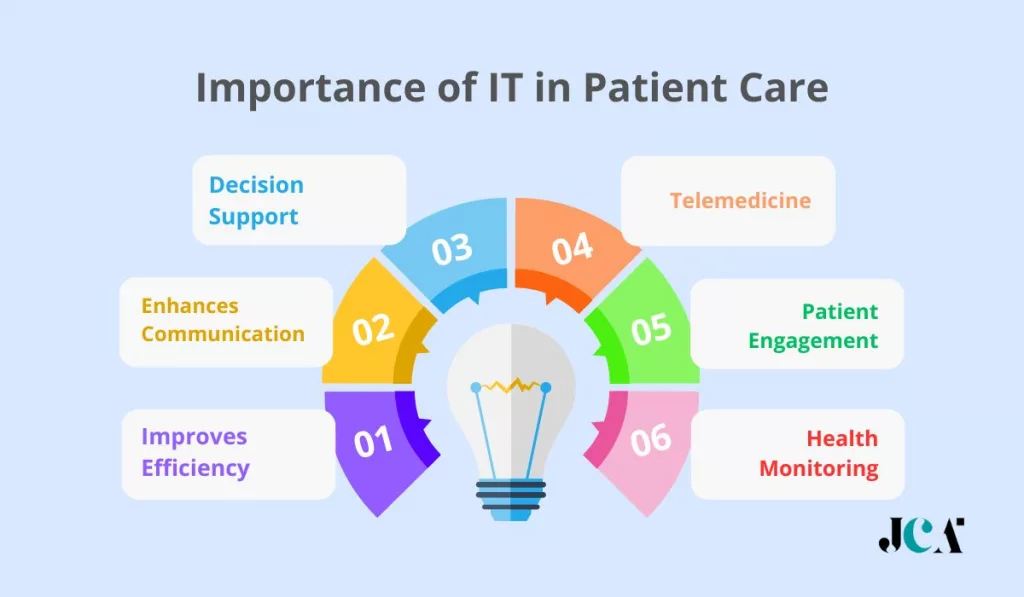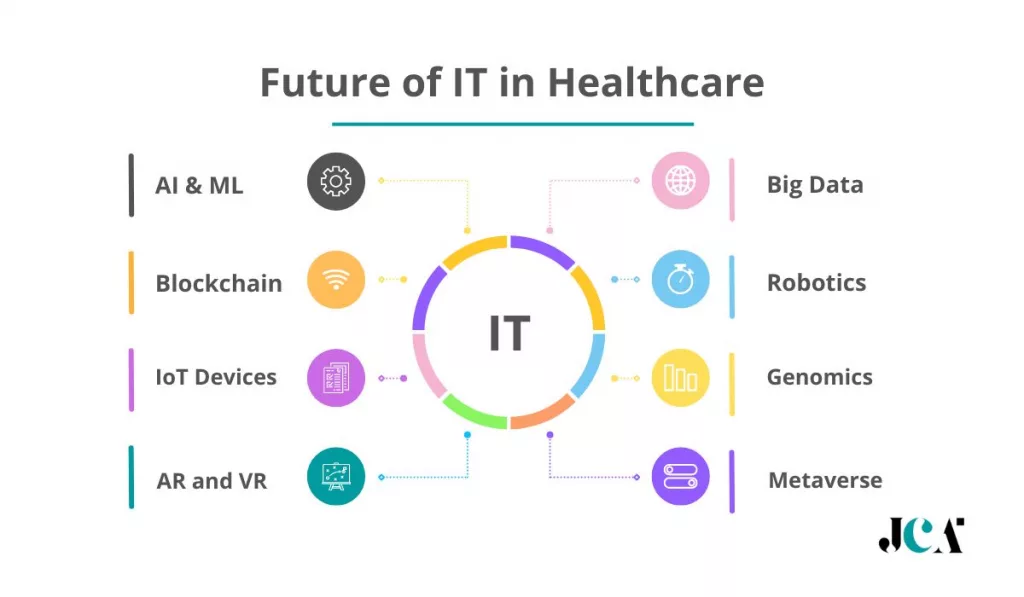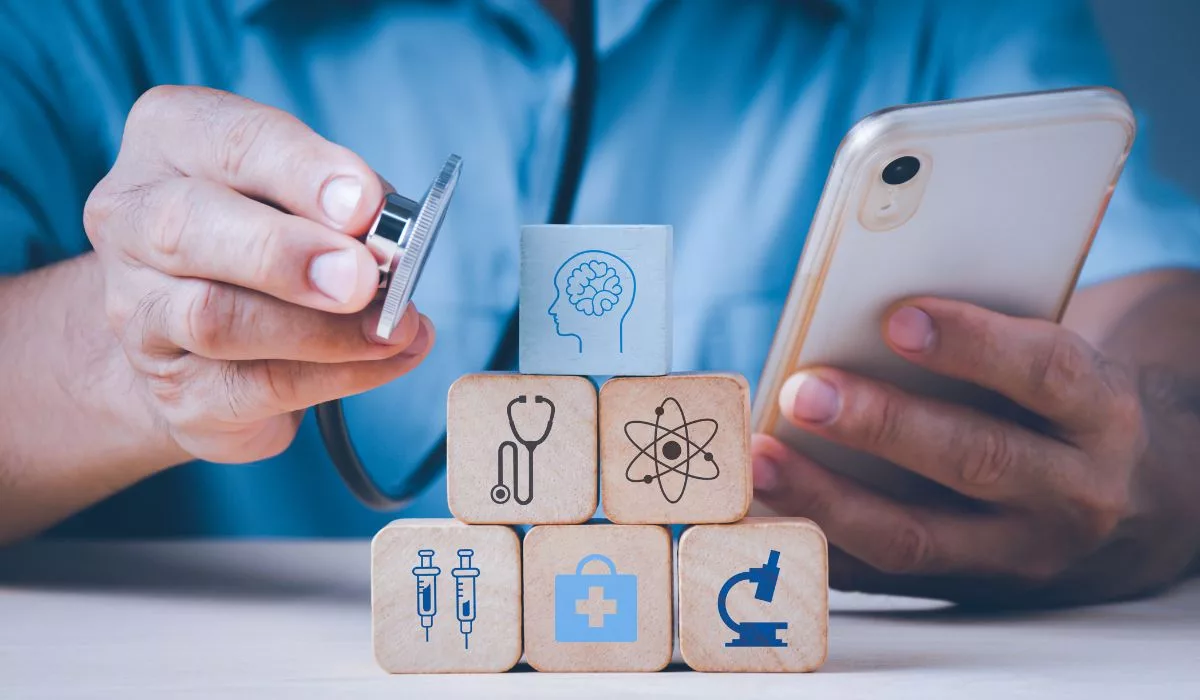The rise of Information Technology (IT) in healthcare has been a transformative force, revolutionizing the way care is delivered and managed. In this dynamic landscape, it has become a powerful tool in improving patient outcomes, streamlining administrative tasks, and accelerating medical research.
If you are an aspiring entreprenur and want to build something exceptional for healthcare industry then you must take a look at Best Healthcare Software Development Companies.
- What is Information Technology in Healthcare?
- How We Began Using Information Technology in Healthcare?
- Importance of Information Technology in Patient Care
- Information Technology and Healthcare Administration
- Role of Information Technology in Medical Research
- Future of Information Technology in Healthcare
- How has information technology helped in the management of the COVID-19 pandemic?
- How does the use of wearable technology and IoT devices contribute to patient health monitoring?
- Conclusion
What is Information Technology in Healthcare?
Information Technology in healthcare, often referred to as Health IT, encompasses the use of various technological systems and services to store, share, and analyze health information. It includes Electronic Health Records (EHRs), telemedicine, wearable technology, and advanced analytics, among others.
IT has a profound impact on healthcare, offering potential solutions to some of the most pressing challenges. From improving patient care through EHRs to making healthcare more accessible via telemedicine, IT has changed the face of the healthcare industry.
How We Began Using Information Technology in Healthcare?
The journey of IT in healthcare began long before the advent of the internet. Early systems focused primarily on administrative tasks like patient registration and billing.
With the arrival of the internet and the digital revolution, the use of IT in healthcare expanded significantly. EHRs began to replace paper-based records, and the concept of telemedicine started to take shape.
In recent years, we have witnessed a surge in technological advances in healthcare, with the rise of Artificial Intelligence (AI), Machine Learning (ML), and Internet of Things (IoT) devices. These advancements have paved the way for remote patient monitoring, precision medicine, and more efficient administrative processes.
You may also like to know the Healthcare Software Development Cost.
Importance of Information Technology in Patient Care

- Improves Efficiency: Electronic Health Records (EHRs) streamline patient data management, reducing errors and redundancy.
- Enhances Communication: Secure messaging platforms improve communication between patients and providers.
- Decision Support: Clinical Decision Support Systems (CDSS) aid in accurate diagnoses and treatment plans.
- Telemedicine: IT enables remote patient consultations, increasing accessibility to care.
- Patient Engagement: Patient portals allow self-scheduling, prescription refills, and access to health records, promoting active involvement in care.
- Health Monitoring: Wearable devices and IoT enable real-time health tracking and early detection of issues.
- Data Security: IT provides tools for secure data handling, protecting patient privacy and complying with regulations.
Also read: Future of IoT in Healthcare: Medical Industry Innovations that will Change the Game
How Electronic Health Records (EHRs) improve patient care?
EHRs are a cornerstone of Health IT. They offer numerous benefits, such as improved patient care coordination, reduction in medical errors, and increased patient participation.
While EHRs are transformative, they also present challenges like data security concerns and interoperability issues. However, through the use of advanced encryption techniques and standardized data formats, these challenges can be mitigated.
The total global EHR market is predicted to reach some 40 billion U.S. dollars in 2025. That would be almost double the size in 2015.
How does telemedicine make healthcare more accessible, and what role does information technology play in it?
Telemedicine, driven by IT, has made healthcare more accessible than ever before. It has dismantled geographical barriers, making it possible for patients to receive care from the comfort of their homes.
Remote patient monitoring, a key component of telemedicine, offers several advantages, such as real-time monitoring of patient health, reduction in hospital visits, and improved management of chronic diseases. However, it also has limitations, including data privacy concerns and lack of access to technology for some patients.
Also have a look at Top Telemedicine App Development Companies.
How does information technology contribute to precision and personalized medicine?
Big data plays a crucial role in the emergence of precision and personalized medicine. It enables the analysis of vast amounts of health data, leading to more accurate diagnosis and targeted treatments.
Real-world applications of personalized medicine are growing rapidly, with genomics and pharmacogenomics being prominent examples. IT plays a pivotal role in these applications, facilitating data analysis and insights.
Also read: Future of IoT in Healthcare: Medical Industry Innovations that will Change the Game
Information Technology and Healthcare Administration
How IT Helps in Streamlining Administrative Tasks in Healthcare?
Information Technology has been instrumental in streamlining administrative tasks in healthcare. Automated appointment scheduling, patient data management, and digital billing systems have significantly reduced administrative burdens, allowing healthcare professionals to focus more on patient care.
What Role Does IT Plays in Healthcare Financial Management?
IT also holds immense potential in healthcare financial management. Efficient IT systems can reduce operational costs, enhance revenue cycle management, and improve the overall financial health of healthcare organizations.
Digital billing systems, powered by IT, have transformed the healthcare billing process. These systems offer numerous benefits like error reduction, faster processing, and improved patient satisfaction.
Also read: How EHR Software Can Help Your Medical Practice?
Role of Information Technology in Medical Research
How AI and Machine Learning is Accelerating Medical Research?
AI and Machine Learning are playing a pivotal role in accelerating medical research. In drug discovery, AI algorithms can analyze vast amounts of data to predict potential drug candidates, significantly reducing the time and cost involved in traditional drug discovery processes.
Predictive modeling, powered by AI and ML, is another promising area in medical research. It allows researchers to predict disease progression, response to treatment, and patient outcomes based on historical data.
How Information Technology Helps in Enhancing Clinical Trials
IT has also improved the efficiency of clinical trials. Digital platforms can streamline patient recruitment and retention, overcoming traditional challenges such as geographical constraints and patient attrition.
Moreover, IT enables efficient data collection and analysis in clinical trials. Real-time data capture, remote patient monitoring, and advanced data analytics can enhance the reliability and accuracy of clinical trials.
Also read: Top 10 Med School Apps For Medical Students
Future of Information Technology in Healthcare
The future of IT in healthcare holds immense promise. Anticipated advancements include more sophisticated AI and ML algorithms, expansion of telemedicine, advancement in wearable and IoT devices, and the use of blockchain technology for secure data sharing. Let’s look at some of the major future trends of IT in Healthcare:

- AI and ML will enable predictive, personalized healthcare.
- Blockchain will boost security and privacy in healthcare data management.
- IoT devices will expand telehealth services, enhancing care accessibility.
- AR and VR will improve medical training and patient education.
- Big data analytics will aid evidence-based decision-making in healthcare.
- Advanced robotics will enable precise, efficient surgeries and care.
- Genomics will pave the way for personalized, precision medicine.
Also read: Importance of Information Technology in Modern Era
How has information technology helped in the management of the COVID-19 pandemic?
Information technology played a crucial role in managing the COVID-19 pandemic. IT enabled remote patient care, tracking and tracing of infection spread, and facilitated rapid research and development of vaccines through AI and ML. Let’s look at some best roles of IT in managing Covid-19 Pandemic:
- Digital Contact Tracing: Apps like Apple and Google’s Exposure Notification system aided in tracking the virus spread, reaching billions of people worldwide.
- Telehealth Services: During 2020, telehealth visits in the US surged by 154% in the last week of March compared to the same period in 2019, ensuring continuity of care while minimizing exposure risk.
- AI Predictive Analysis: BlueDot, an AI platform, identified COVID-19 nine days before the WHO, demonstrating the potential of AI in early detection of outbreaks.
- Data Visualization: Johns Hopkins University’s real-time COVID-19 dashboard became a go-to resource globally, providing accessible, visualized data to track the pandemic’s progression.
- Vaccine Development: BioNTech used bioinformatics tools to design the COVID-19 mRNA vaccine in days, accelerating the traditionally lengthy vaccine development process.
Also read: The Role of Information Technology (IT) in Supply Chain Management
How does the use of wearable technology and IoT devices contribute to patient health monitoring?
Wearable technology and IoT devices, powered by IT, contribute significantly to patient health monitoring. The ways these devices help in patient monitoring are:
- Real-Time Monitoring: Wearable devices like Fitbit or Apple Watch can track vital signs like heart rate and blood pressure in real-time.
- Early Warning Systems: Advanced wearables can detect abnormalities and trigger alerts, potentially predicting health issues before they become severe.
- Personalized Insights: Data from wearables can provide insights into a patient’s health patterns and lifestyle, enabling personalized care.
- Remote Patient Monitoring: IoT devices can relay patient data to healthcare providers remotely, reducing hospital visits and enabling timely intervention.
- Medication Adherence: IoT pill dispensers can remind patients to take medications and notify caregivers of missed doses.
- Sleep Quality: Wearables can monitor sleep patterns, contributing to diagnoses of sleep disorders.
Conclusion
In summary, Information Technology is a transformative force in healthcare. It has revolutionized patient care, streamlined administrative tasks, accelerated medical research, and played a crucial role in managing the COVID-19 pandemic.
The road ahead for IT in healthcare is full of possibilities. As we continue to embrace and innovate with technology, we can look forward to a healthcare system that is more efficient, accessible, and patient-centered. The challenges exist, but with continued advancements and collaboration, we can harness the full potential of IT in healthcare.










Leave a Reply